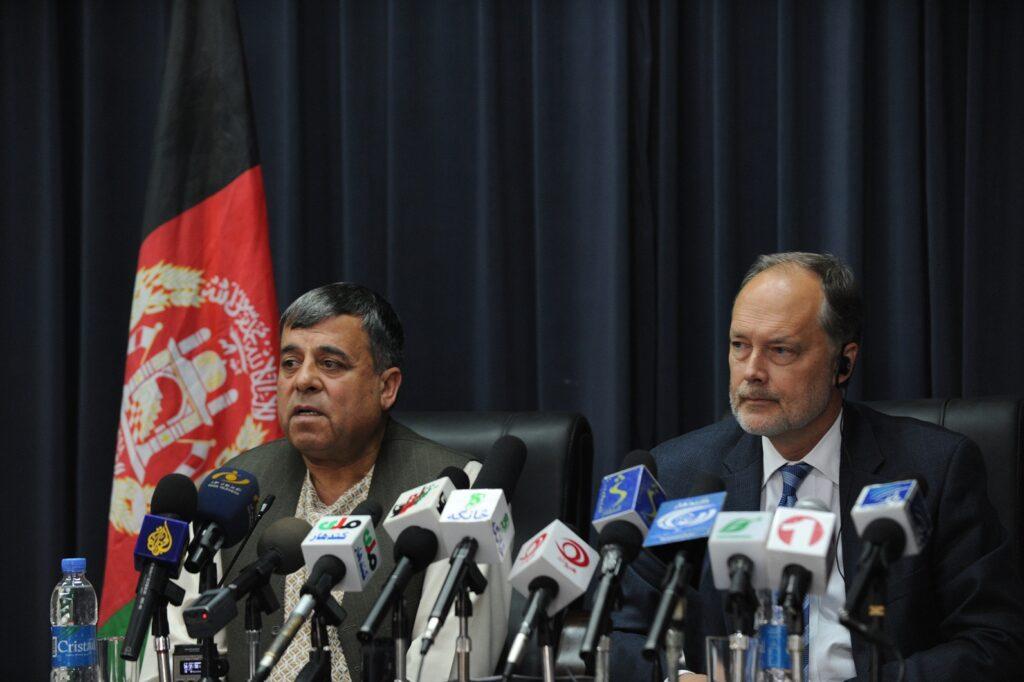KANDAHAR CITY (PAN.
As the allies continue to bicker on the sensitive issue, James Cunningham told journalists in Kandahar City that the US special envoy’s statement on the subject was nothing new.
“Not only does the United States but several other countries also recognise the Durand Line as a formal frontier,” said the ambassador, flanked by Kandahar Governor Toryalai Weesa.
A day earlier, Kabul took strong exception to US Special Envoy Marc Grossman’s statement that the Durand Line was an internationally recognised border between Afghanistan and Pakistan.
On his arrival in Kabul from Islamabad, the diplomat told Channel One the United States considered the Durand Line an international border.
Soon after his remarks were aired, the Ministry of Foreign Affairs said the status of the Durand Line was a matter of historic importance for the Afghan people.
“The Afghan government, therefore, rejects and considers irrelevant any statement by anyone about the legal status of this line,” the ministry spokesman, Janan Musazai.
Also on Tuesday, several lawmakers only the Afghans reserved the right to take a decision on the Durand Line and outsiders’ remarks in this regard amounted to interference in the country’s internal affairs.
The 1,500-mile border was agreed in a treaty signed on November 12, 1893, in Kabul by Sir Mortimer Durand, representing British India, and Amir Abdur Rahman, the ex-Afghan king.
But Afghanistan has never accepted the legitimacy of this border, arguing that it was intended to demarcate spheres of influence rather than international frontiers.
Grossman’s remarks fuelled a heated debate during the Senate session today, when a member said the Afghans alone could decide the fate of the controversial line.
Mohammad Daud Hassas added: “Neither Grossman nor his country is authorised to given their opinion on the Durand Line.” Since the Afghans did recognise the line, such remarks by the Americans would lead to bad consequences, he observed.
Hafiz Abdul Qayyum, a senator from eastern Nuristan province, remarked: “The US is neither a judge nor a prosecutor to settle the problem between Afghanistan and Pakistan.” He suggested the neighbours should sit across the negotiating table to find a solution.
Deputy Chairman Mohammad Alam Ezedyar, who chaired the session, said: “If the US has any viable strategy for resolving the dispute, we welcome it. But we vehemently denounce Grossman’s statement as meddling in our political affairs.”
During his trip to the southern province, Cunningham met Independent Directorate of Local Governance (IDLG) officials on the current situation and Kandahar’s problems.
Governor Weesa said he had discussed with Cunningham a wide range of issues, including security, good governance and economic development of the province.
He added the global fraternity, particularly the US, remained committed to long-term assistance to the country, and the people should not worry about the post-2014 situation.
He said the US had spent $100 million on road, power, education and agricultural projects in Kandahar last year. The aid was reflective of the US commitment, he observed.
Cunningham ruled out a return to the 1990s-like situation in Afghanistan after the withdrawal of NATO-led troops in 2014.
The Chicago summit, the Tokyo Conference and strategic cooperation accords with several countries guaranteed continued global economic and military aid to Afghanistan, he concluded.
mud
Visits: 3









GET IN TOUCH
NEWSLETTER
SUGGEST A STORY
PAJHWOK MOBILE APP